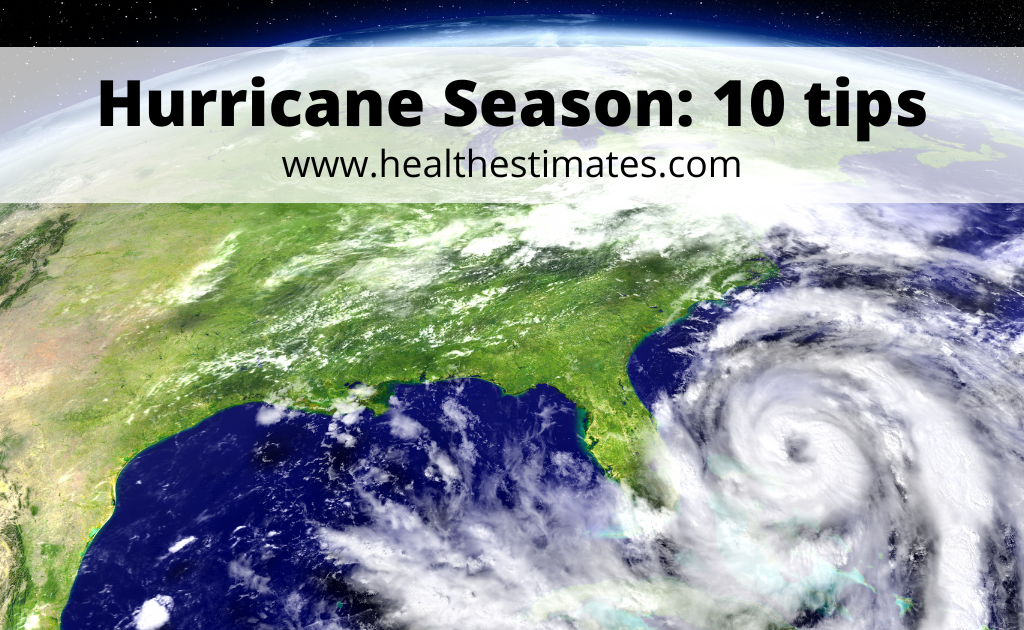
From heavy rainfall to high-speed winds, hurricanes are an intimidating force of nature that can put you and your family in harm’s way. Some US States, like Florida and Massachusetts, are at a greater risk of being affected than others, so it’s important to be prepared for hurricanes.
Knowing what to do isn’t always easy, so we’ve created our top 10 checklist. This will help you keep yourself and your family safe this hurricane season.
East Coast Hurricane History
With experts reminding us that an average of 6 hurricanes hit the US each year, it’s vital that you’re prepared for any emergencies, especially if you live in or around Florida and Massachusetts. The East Coast of the US is unfortunately prone to extreme weather conditions. Some of the most damaging hurricanes in recent history include:
Hurricane Irma
In the 2017 hurricane season, Irma played a big part in the costliest hurricane season ever experienced by the US, causing 134 recorded fatalities and over $1 billion of damage across its four affected countries.
Hurricane Michael
One of the most destructive hurricanes to hit the US, Michael caused at least 74 fatalities, 59 of which were among Americans. This 2018 hurricane was the first in Category 5 ever recorded across the Florida Panhandle, and left $25.1 billion of damages in its wake.
Hurricane Hanna
2020’s Hurricane Hanna indirectly caused at least 5 fatalities through rip currents and flooding, and an estimated $1.2 billion worth of damage was left in its aftermath.
The Ultimate Hurricane Preparation Checklist – Our Top 10 Tips
As we’ve seen time and time again, the true destructive potential of hurricanes should not be underestimated, and as we enter the season being prepared for hurricanes is vital – research has shown that climate change is actually increasing the intensity of hurricanes around the world.
To help you stay safe, here are our top 10 tips to prepare for almost any eventuality:
1) Plan Ahead
Depending on where you live, your local community might have a specific disaster plan or evacuation route, so getting up to speed with the standard procedures is an important part for you to become prepared for hurricanes. Make sure you discuss your plan with friends and family members, too, and consider what steps you’ll be taking to protect the welfare of any children or pets who might rely on you for support.
One of the biggest decisions you might need to make as part of your preparation is whether you’ll be moving away or staying put, as this will impact most of your other choices.
Preparing To Evacuate
For the safety of yourself and any dependants, if you’re realistically able to evacuate before a serious hurricane, this is likely the best choice. Think clearly, follow your plan and remember to take any emergency items with you. It’s usually better to wait an extra few seconds before rushing out the door than to realize you’ve forgotten something important long after you’ve left the area. Obviously, use common sense.
Planning To Stay Put
If you aren’t able to evacuate, don’t worry! There are some steps you can take if you’re planning to stay put, such as preparing an emergency kit and seeking out an appropriate shelter room. As long as you stay calm, you can keep yourself and your family safe.
2) Get Insured
As part of your preparation, take the time to insure your home and vehicle against hurricane damage. Remember to itemize any possessions that you’re insuring, and keep your receipts for expensive electronics, to make claiming easier if necessary.
Being in the insurance industry ourselves, we know all too well how important it is to thing about this ahead of time.
3) Keep Important Items On Hand
As part of your emergency planning, make sure that you keep your most important items on hand. A basic checklist should include:
- Important Documents
Keep any important documents like your passport, legal papers, certificates and insurance information safely tucked away in a waterproof wallet or safe. If possible, take a photo or scan and upload the copies to an online storage system like the Cloud or Drop Box. Have your paper originals close by at all times, so that you can locate them easily in an emergency. It’s also useful to let the other members of your household know where they are, so that they can find them if you’re not at the property.
- Power Banks
Power banks are an underrated piece of kit to have on hand in case of any emergency, but they are particularly useful when dealing with hurricanes. Having a portable mobile phone charger means that even if your phone dies, you can still contact emergency services or friends and family. You can find power banks for sale online, and it’s useful to have one or two handy just in case.
- Emergency Kit
If the worst happens, and you’re caught up in a damaged area, having an emergency kit could save a life. Don’t take chances – pack flashlights, non-perishable food items, blankets and spare clothing. You can also keep a small amount of cash on your person, as well as the telephone numbers of local services and family members.
4) Create A Shelter Room
If you’re planning to stay put, you should create a shelter room. According to FEMA, the safest room in any building will always be the smallest on the ground or lower levels. It should be windowless, and free of any flood risk – your priority should always be to avoid floodwater. Remember, even objects that are usually harmless can be dangerous during a hurricane, so think about any possible risks of the items inside, like propane tanks or electrical wiring.
Once you’ve decided where your shelter room will be, stock up with your emergency kit and food items to be more prepared for hurricanes.
5) Invest In A Safety Deposit Box
If you can’t feasibly take your important items or documents with you should you need to evacuate, then investing in a safety deposit box is a great way to prepare for hurricane season. Sometimes your bank may provide one free of charge at their location; regardless, the monthly fee is worth the investment.
Alternatively, if you’re staying put, and you’ve created a shelter room, then this is perfect place to store your safety deposit box.
6) Strengthen Your Home
Whether you’re sheltering in place or evacuating, strengthening your home is a solid investment that can minimize hurricane damage. There are some steps you can take to do this, such as:
- Installing Wind Shutters – cover any windows or glass to prevent breakage.
- Checking Your Doors – any external doors should be made of a suitable, wind-proof material, and should be fitted with heavy-duty locks.
- Using Lightweight Landscaping Materials – instead of using gravel or stone for landscaping, opt for lighter materials that will cause less damage if swept up in strong winds.
- Removing Dangerous Objects – if you have any propane tanks, remove them from the area or anchor them to the ground, especially if you plan to shelter in place.
7) Secure Your Outdoor Space
If you’re planning to temporarily move away from home during hurricane season, it’s important that before you leave you take action to secure your outdoor space. Anchor down any moveable items, and focus on securing those that are heavy with the potential to cause damage. If you have a pool, lower the water level by around a foot, to help prevent further flooding.
8) Park Your Vehicles Safely
Ideally before hurricane season approaches, consider where and how you’ll park your vehicles. Avoid parking near any power lines or under any trees – in a hurricane, trees are often uprooted. Not only can falling branches damage your vehicle, but strong winds might also send nearby trees into it. Instead, choose to park inside a garage or sturdy enclosed space.
9) Know What To Do If You Get Caught In A Hurricane
Ultimately, no matter how intensively you prepare for hurricane season, sometimes you can simply find yourself in the wrong place at the wrong time. If the worst happens, and you find yourself in the midst of the hurricane, don’t panic! Stay calm, collect your thoughts and implement your action plan. Remember:
- Go To Your Shelter Room. As soon as possible, go with your family and any pets to your shelter room.
- Be Ready To Leave Your Home. If emergency authorities order you to leave or if your home is damaged, you may need to go to a shelter or a neighbor’s house.
10) Prepare For The Aftermath
After a hurricane strikes, it’s more important than ever for communities to pull together and support each other. However, there are some environmental hazards that can affect the local area even after the worst of the hurricane has passed, so it’s critical that you keep these in mind:
- Flooded roads can have hazards underfoot that can’t be spotted above the surface, so don’t walk or drive through them. Try to take an alternative route or call for outside help.
- Keep an eye out for water-exposed powerlines – if a powerline is submerged in water, the water itself can become electronically charged, which is risky for passers-by. Objects that come into contact with them, like trees or fences, can also become energized. If you spot a fallen power line, don’t go near it – call your utility company to make a report, and wait for them to confirm that the line is safe.
- Be careful about drinking tap water until local authorities have confirmed that it is safe.
- Only return to the area once authorities have given the go-ahead. This can take some time, as all potential hazards will need to be identified and removed. Take this time to contact loved ones and ensure their safety.
Hurricanes are scary, and can be life-changing events, but by planning ahead and staying calm, you can prepare for just about anything – follow our top 10 tips and you’ll be entering hurricane season with confidence.





